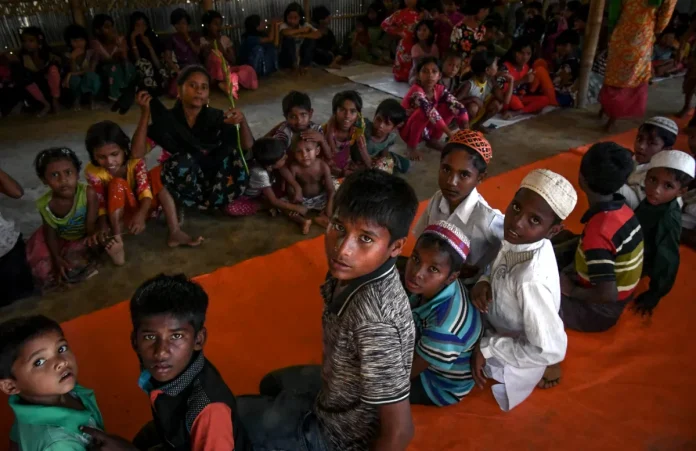Rights group praises Malaysia’s response to the boat tragedy, citing genocide and trafficking networks for high-risk sea crossings
PETALING JAYA: The Myanmar Ethnic Rohingya Human Rights Organisation in Malaysia (Merhrom) has praised Malaysia’s rapid response to the Langkawi boat tragedy, saying the deadly incident reflects a worsening humanitarian emergency as Rohingya continue fleeing intensifying violence in Rakhine State.
However, its president, Zafar Ahmad Abdul Ghani, said that the Langkawi boat tragedy – first reported on November 6 – is a direct consequence of ongoing Rohingya genocide in Rakhine State, claiming civilians have been left with no safe escape routes as fighting intensifies between Myanmar military and the Arakan Army (AA).
“This is the manifestation of ongoing Rohingya Genocide in Rakhine State perpetrated by the Myanmar Military and the AA.
“The Rohingya were trapped inside the Arakan State without freedom of movement and humanitarian aid.
“There is no way out for the Rohingya. Thousands of Rohingya were shoot to death while escaping genocidal attack by the Arakan Army (AA) since last year,” Zafar said.
Zafar added tha credible documented evidences – including findings from UN bodies, Fortify Rights and international monitors – had shown mass killings, forced displacement, targeted violence and systematic denial of basic rights towards Rohingyas.
He also claimed that armed groups have, for years, kidnapped Rohingya villagers and handed them over to the trafficking syndicates to extract ransom from relatives in Malaysia.
“We have enough credible documented evidences of ongoing Rohingya Genocide by the United Nations, Fortify Rights and other human rights groups.
“For many years, thousands of Rohingya were kidnapped by the AA and sold to the traffickers for ransom.
“They were brought to Thailand where the traffickers demanded ransom from their family members in Malaysia. Failing that, Rohingyas were tortured to death.”
Zafar said deteriorating conditions inside Myanmar and in the Cox’s Bazar refugee camps in Bangladesh have pushed more Rohingya to undertake dangerous maritime journeys, often without knowing their final destination.
“We have suffered enough for the longest decades as victims of genocide. We lost everything. To save our lives is to flee the genocide. But this does not guarantee we reach the other shore while seeking safety.
“This tragedy is among the biggest tragedy in the history where hundreds of Rohingya including women and children sanked in the ocean.”
Merhrom said the public must understand the Rohingya situation in its proper context, and urged the Asean councils to enforce stronger policy to combat the ongoing genocide in Rakhine State.
“We must emphasise that Rohingya are not migrants. We are not victims of conflict or sectarian violence. We are victims of ongoing genocide in Myanmar just like Palestinians and Sudanese.
“As Five-Points Concensus has failed, Asean need to look for new workable measures to end the Genocide and war in Asean to ensure the safety of Asean ethnics.
“We need timely and greater international actions to speed up International Court of Justice and International Crime Court process to end the genocide and to protect the lives of Rohingya minority – the most prosecuted ethnic in the world and the civilians.”
On Nov 18, theSun quoted a source from a Malaysian Rohingya community claiming that Myawaddy in Myanmar’s southeast had become a key transit point where armed groups abducted civilians and sold them to trafficking syndicates operating along the Thailand-Malaysia route.
Regional scholars later clarified that while Myawaddy functions as one major gateway for illicit movement, it is part of a broader trafficking corridor in which Rohingya are moved through multiple transit countries before reaching Malaysia.
In the same coverage, United Nations High Commisioner of Refugees (UNHCR) provided theSun an updated data showing that around 22,460 Rohingya have attempted sea crossings from Bangladesh and Myanmar since February 2022, underscoring a sharp rise in high-risk departures across the Bay of Bengal and Andaman Sea.
Of these, 782 Rohingya were rescued or safely disembarked in Malaysia during the same period, including 196 in the past 12 months.
UNHCR also reported that Malaysia currently hosts about 189,700 refugees and asylum-seekers from Myanmar, representing roughly 12% of displaced Rohingya in the region as of Oct 31.
Doctors Without Borders (Médecins Sans Frontières, MSF) clinicians told theSun that Rohingya arriving after months in the jungle were severely malnourished and traumatised, with survivors reporting electrocution, confinement in pits of waste and sexual violence, requiring urgent psychiatric stabilisation.
On Nov 17, Kedah and Perlis Maritime deputy director (operations) Zainudin Zuki said the nine-day search was called off at 6.30pm, with 43 victims found – 14 survivors and 29 bodies – after no new leads and worsening weather risks.








